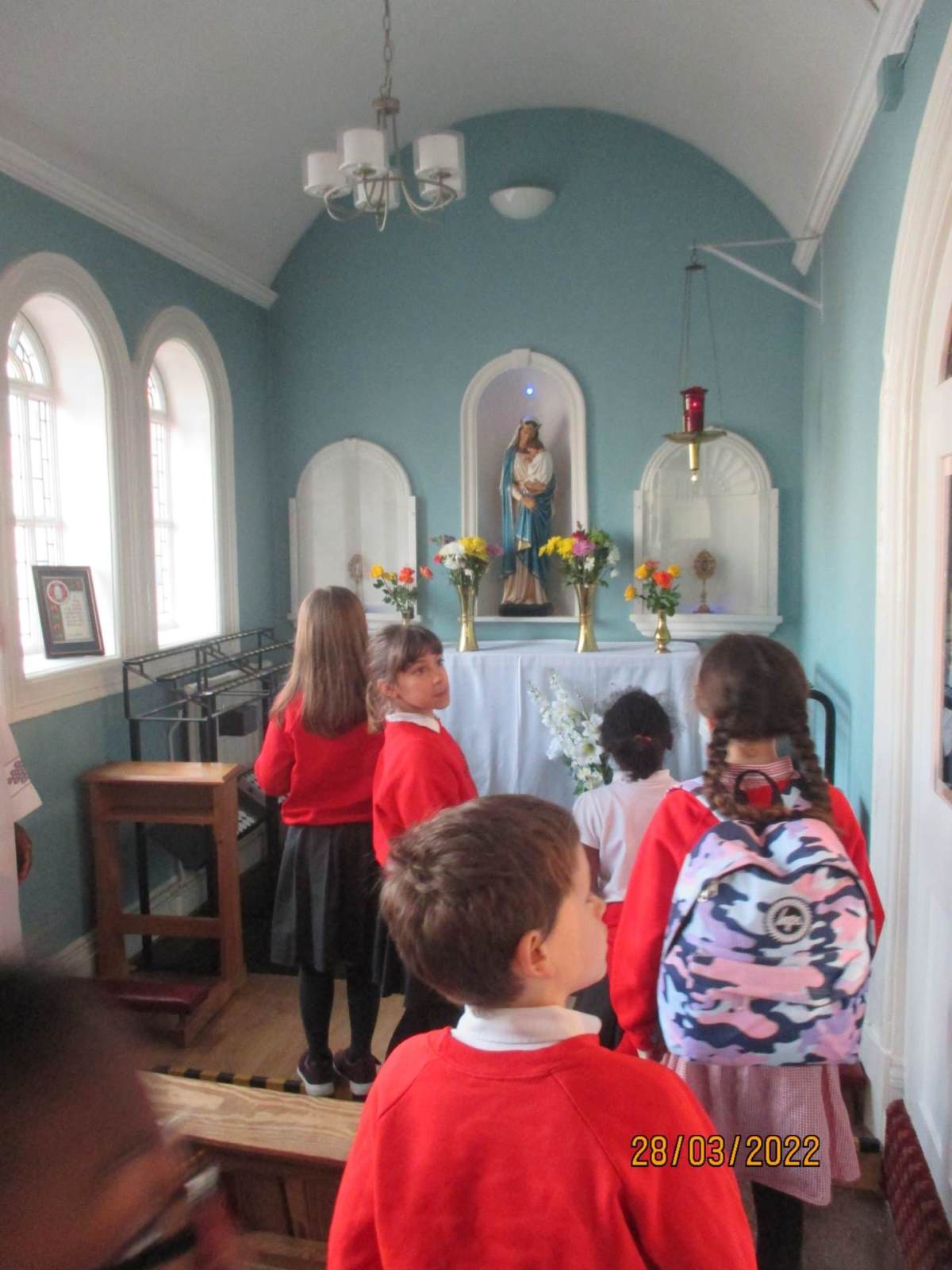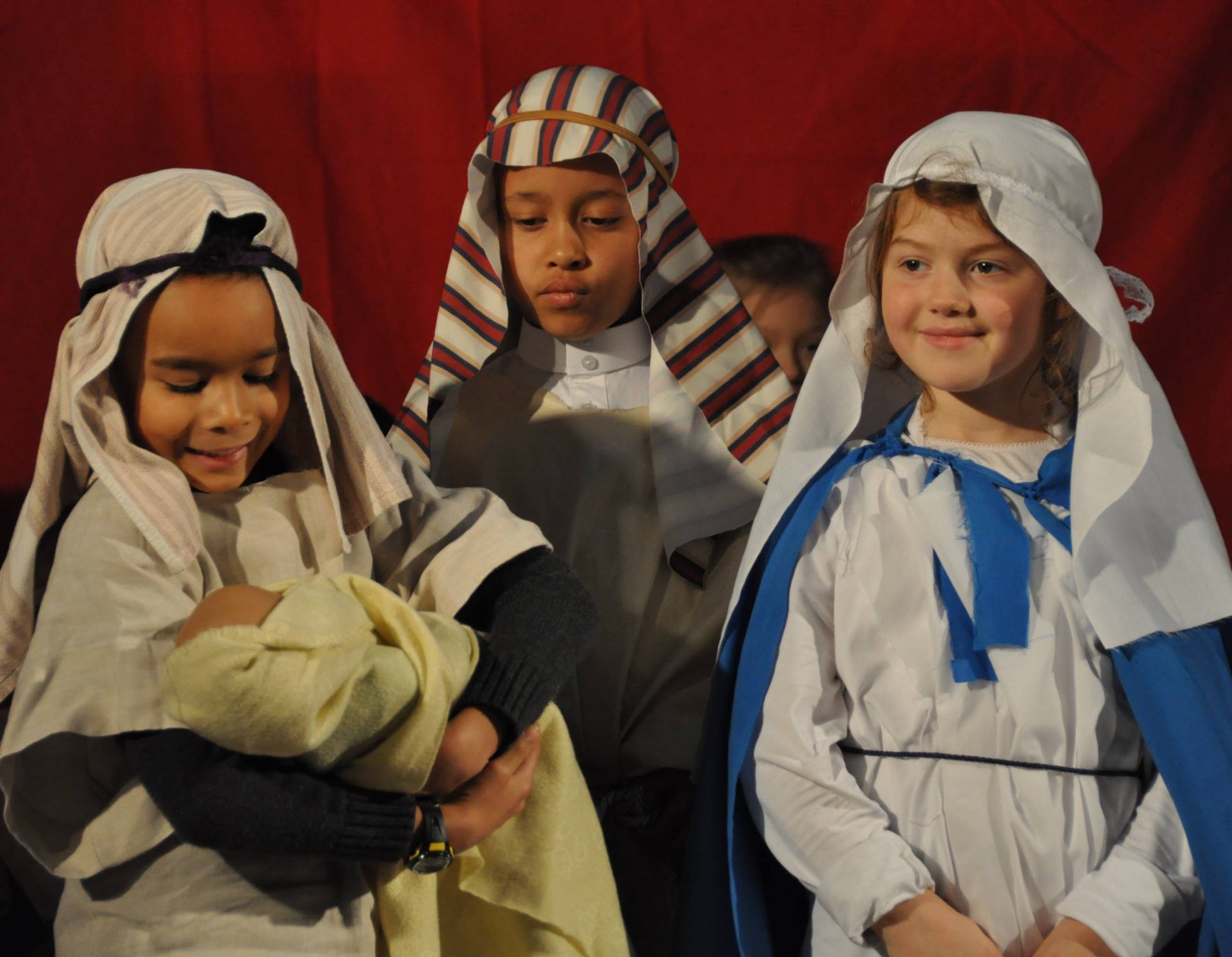Religious Education
At John Stainer we love learning about other religions during our special RE Days each half term.
John Stainer is a culturally diverse school representing different cultures, faiths and nationalities. We deliver a rich Religious Education curriculum with an aim to ensure the spiritual, moral, cultural, social, mental and physical development of our children. We also encourage children to develop an understanding and appreciation for the expression of beliefs, cultural practices and influence of principle religions and worldviews in the local, national and wider global community. Through our RE lessons we are able to closely link work to our core school values, particularly community and respect. It promotes open-mindedness towards others with different faiths and beliefs and encourages children to develop their sense of identity and belonging through self-awareness and reflection.
- Many children in Lewisham come from religious backgrounds but others have no attachment to religious beliefs and practices. The RE curriculum is broad and balanced to reflect this. Christianity and other principal religions represented in Great Britain (Buddhism, Hinduism, Islam, Judaism and Sikhism along with Humanism) are studied across the key stages. Children also study how religions relate to each other, recognising both similarities and differences within and between religions.There are strong links with the fundamental British Values with inbuilt opportunities for children to reflect on these values in line with RE.
- Pupils can then begin to make sense of religion and reflect on their own ideas and ways of living.
- We encourage our pupils to ask questions about the world, and to reflect on and voice their own beliefs, values and experiences.
- Lessons provide opportunities for children to confidently share their own viewpoints without embarrassment or ridicule.
- We deliver a sequential curriculum which allow pupils to gain deep knowledge of Religious Education over time.

We celebrate Religious festivals throughout the year and invite visitors from faith communities to lead assemblies. Classes also visit different places of worship. We recognise that ‘RE contributes to spiritual, moral, social and cultural development of all children and young people when taught well in schools, and through this, makes a significant contribution to helping pupils develop and demonstrate skills and attitudes that will allow them to participate fully in and contribute positively to life in modern Britain.’
Every 6 weeks we spend a whole day celebrating the importance of, and learning about different religions. Our children look forward to RE days and enjoy learning about the diversity of different faiths and cultures. Lessons can include a focus on the following:
- The origins of a religion
- Who is worshipped in different religions
- Special events during a festival and the meaning of the festival
- Using imaginative play or drama to express feelings and ideas
- Responding to images, games, stories, art, music and dance
- Handling artefacts
- Learning about what people wear and eat
- Exploring scared texts
- Meeting visitors from local religious communities
- Making visits to religious places of worship where possible, and where not, making use of videos and the internet or members or leaders from different groups (this includes members of staff who play these roles in their religion)
- Taking part in whole school events - (Harvest Festival, school performances)
- Using ICT to further explore religion and belief globally
- Comparing religions and world views through discussion
- Debating and communicating religious belief, worldviews and philosophical ideas and answering and asking questions.
- Participating in moments of quiet reflection
These give children a greater understanding of the world we live in and the people that we share it with and help us to respect the thoughts and beliefs of others.

On an RE Day all teachers deliver a unit based on the aspect of the religion, theme or faith being studied. The lessons are taught and assessed against key knowledge, skills and understanding of these religions. The children also have an opportunity to reflect on their learning about (or from) the different faiths.
I love RE days because I get to learn about different things from the past. It gives me an understanding of important events.
Sonny
RE days help us to understand other people’s cultures e.g. the way they dress. It helps me to relate to people who are different to me.
Ilana
Collective worship
It is the law that we provide a daily act of 'collective worship'. This is not just narrowly limited to praying, but is much wider in relation to 'reverence or veneration to a higher power'. Therefore we approach it in many different ways, and these daily acts will take place in class and may take the form of any of the following activities
- Meditation
- Developing a sense of awe and wonder about the world
- Affirming positive values, such as honesty or self-sacrifice
- Encouraging responsibility for making personal decisions
- Celebrating achievement and special occasions
Intent
At John Stainer we believe that it is important for all our pupils to learn from and about religion, reflect on and celebrate the diverse religious characteristics of our school and the wider world, so that they can understand the world around them. Children are given tools to enable them to:
- embrace our school’s core values and show mutual respect for the major world religions while making linksbetween the religions and challenging stereotypes.
- develop their intellectual, social, emotional and spiritualunderstanding of themselves and the world in which they live.
- develop their understanding and awareness of the beliefs, values and traditions of other individuals, societies, communities and cultures.
- develop the ability to make reasoned and informed judgements about religious and moral issues and enhance their spiritual, moral, social and cultural development.
Implementation
We adapt and follow the Lewisham Agreed Syllabus for RE: Learning together through faiths. Our RE curriculum is delivered in blocks eg a whole morning or afternoon or a full day. Teachers deliver units based on the aspect of the religion, theme or faith being studied. Lessons are taught and assessed against key knowledge, skills and understanding of these religions. The children also have an opportunity to reflect on their learning about (or from) the different faiths. Our RE curriculum is further enhanced with the use of artefacts, visits to places of worship and educational visitors joining lessons in school.
Impact
To ensure consistency throughout the school, leaders ensure that:
- Staff receive regular planning support where and when needed.
- Topics are reviewed to meet the needs of pupils and reflect the diverse community.
- Regular book looks, planning scrutiny and pupil voice takes place to ensure consistency.
- Learning walks provide opportunities for feedback
- Regular investment in up to date resources
As a result of this, pupils make good progress from their starting points and teaching and learning is consistent.
- Enjoyment of the subject demonstrated by “Pupil Voice”
- Reflective pieces of work on how the Fundamental British Values are linked with RE eg a demonstration of mutual respect for all.
- Improved behaviour and attitude to others from different faiths and cultures in and outside of our immediate community.
- Ongoing formative assessments in lessons which checks children's short and long term memory eg plenaries, starters, pupil voice meetings and intervies etc
- Written pieces around topics.

